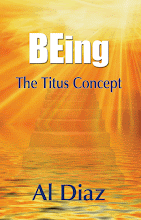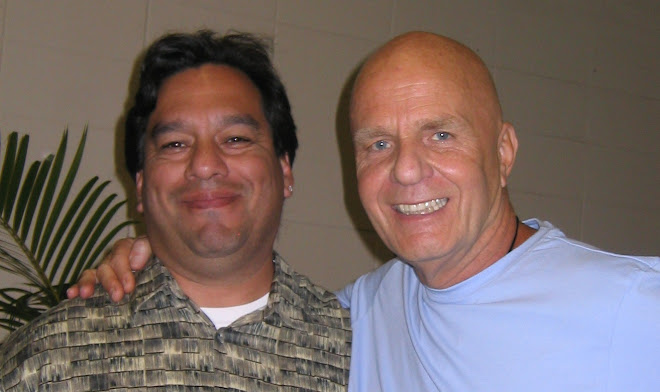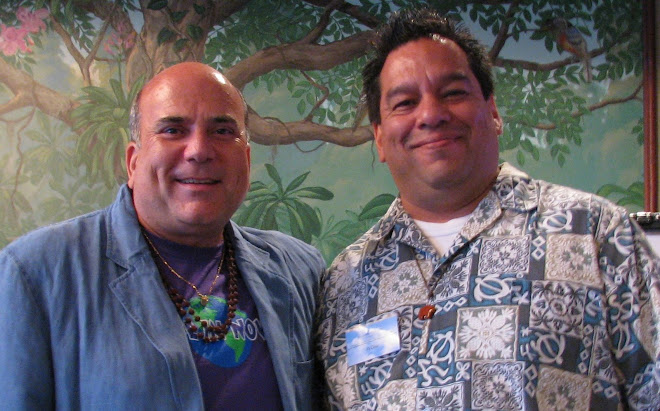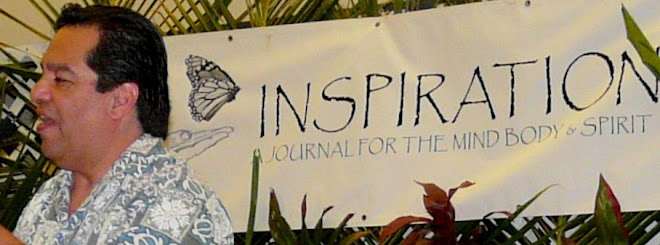Friday, July 18, 2008
The innate power or ability we all have...
First let me tell you that the following article by John Randolph Price is a little bit long, but it is worth the read. He provides powerful insights regarding the innate power that we all have and how the Universe functions. Read the article and keep what resonates and discard the rest.
Ilumine Ao,
Al Diaz
Between 2500 and 1500 B.C. (the dates vary), Hermes Trismegistus, the "scribe of the gods," came on the world stage to tell about the Spirit of the Divine within. In his writings, he implores humanity to "rise from your sleep of ignorance" and to find the Light. He tells us that we have the power to partake of immortality when we change our minds, and he gave us the Seven Hermetic Principles as the way to mastery. They are as follows:
1. The Principle of Mentalism: There is but one Mind, one Power, all Divine. We use the same mind and power in our individual worlds that the All did in creating the universe.
2. The Principle of Correspondence: As above, so below. This shows us that there is a correspondence or analogy existing between things spiritual and things physical -- the same laws operate in each realm. This is truly the secret of manifestation.
3. The Principle of Vibration: In each energy field, there is a vibration of either attraction or repulsion based on the trend of thoughts. These thoughts are both conscious and unconscious, and on each level, creative action is taking place.
4. The Principle of Polarity: Polarity is to think and feel in a certain direction, to bring our thoughts in tune with Infinite Mind, which forms a path for the flow of the divine energy. It is living life according to our highest truth.
5. The Principle of Rhythm: Life is like a pendulum, a swinging back and forth. When we understand this principle, we polarize ourselves at the point of optimum living, thus neutralizing the ups and downs of life.
6. The Principle of Cause and Effect: Every cause has its effect; every effect has its cause; everything happens according to Law. Chance is but a name for the Law not recognized. As a man thinketh in his heart, so is he.
7. The Principle of Gender: Each individual is both male and female, mind and feelings, objective and subjective, the I and the Me. What the mind impresses on the feeling nature is manifest in the phenomenal world.
In 1335 B.C., Moses brought his esoteric teachings from Egypt in the Exodus. According to Manly P. Hall, "Moses was an accredited representative of the secret schools, laboring -- as many other emissaries have labored -- to instruct primitive races in the mysteries of their immortal souls.... The word Moses, when understood in its esoteric Egyptian sense, means one who has been admitted into the Mystery Schools of Wisdom and has gone forth to teach the ignorant concerning the will of the gods and the mysteries of life, as these mysteries were explained within the temples of Isis, Osiris, and Serapis."
Zoroaster appeared in 628 B.C., to be known as the Persian prophet who taught the truth of the one and only God, a Supreme Being of Good Thought, Beauty, Holiness, Righteousness, Perfect Health, Dominion, and Immortality. Zoroaster believed in the oneness of God and individual being, and that prayers were the "speaking of friend to friend."
Lao-tzu incarnated in 604 B.C., later to found the Taoist religion in China, with its emphasis on living in harmony with the great Universal Impersonal Power. He taught that Heaven, Earth, and man/woman were all created to be in harmony with one another, but we lost our way and miscreated a world of disharmony.
We move on now to about 600 B.C., when Pythagoras -- a Mason, and also considered to be the world's first philosopher - was born. He founded a Mystery School at Crotona in Southern Italy, and his teachings reveal another important thread in the Golden Cord of the Perennial Philosophy, an ancient truth carried forward to this day. Pythagoras taught that God, or Supreme Mind, was the Cause of all things, and since God was all Truth, then the effect of this Cause must be Truth, or Spiritual Reality -- when the individual was in harmony with Cause. He believed that we needn't ask for anything because the Intelligent Power of God was eternally providing all things necessary. Thus, the "secret" of prayer was to be in tune with Infinite Mind.
In 563 B.C., Siddhartha Gautama came forth to become Buddha, the Enlightened one. He believed in universal good will expressed from a heart of love "that knows no anger, that knows no ill will." Gautama understood that lack, limitation, disease, and death are but illusions, not created by God, therefore not real. His Eightfold Path to freedom encompassed right belief, right aspiration, right speech, right action, right livelihood, right effort, right thought, and right meditation. As a true New Thought statement, he said, "All that we are is the result of what we have thought. If a man speaks or acts with an evil thought, pain follows him. If a man speaks or acts with a pure heart, happiness follows him, like a shadow that never leaves him."
In 427 B.C., the Greek philosopher Plato entered the Earth plane. At the age of 49, he was initiated into the Greater Mysteries, the initiation taking place in the Great Pyramid of Egypt. In 397 B.C., he opened a school called the Academy, which became the first university in the history of Europe. Plato put great emphasis on the Ideal Life as a goal toward which people should work. This "Ideal" means that every individual is worthy of a royal life of beauty and nobility -- that nothing is impossible to "Gods in Expression." He also introduced the Christos: the immortal Self endowed with all the qualities of Deity.
Then we had the Master Jesus, an Essene. He was introduced to us in the New Testament, and his statements of Truth continue to shine through the pages. However, as a whole, these books of the Bible, which weren't finalized until nearly A.D. 400, must be interpreted esoterically. As we shall see, they've been rewritten numerous times to prove the church's point of view; yet secretly, enlightened ones have contributed their part and have provided coded instructions reflecting the teachings and philosophy of the earlier Masters. Jesus, the Master of the Law of Love, is shown to be the representative of everyone, our brother in the universal family of God, a Model for our completeness -- spiritually, mentally, emotionally, and physically.
We're told that we are the light of the world, that we must be perfect as a fact of life, that we are to heal the sick, raise the dead, cleanse the lepers, cast out demons because all things are possible. This is true, for the kingdom of God is in the midst of you. Ye are gods and the Spirit of truth dwells with you, in you. You yourself are full of goodness, filled with all knowledge, for you have received, not the spirit of the world, but the spirit which is from God. Christ in you, the hope of glory. You are of God.
In the Pistis Sophia Treatise of the Gnostics, Jesus takes it even further: "Do ye still not know and are ye ignorant? Know ye not and do ye not understand that ye are all Angels, all Archangels, Gods, and Lords, all Rulers, all the great Invisibles, all those of the Midst, those of every region of them that are on the Right, all the Great Ones of the emanations of the Light with all their glory . . . "
The truth was clearly expressed, and with this remembering in minds and hearts, the powers were again released. In the Decline and Fall of the Roman Empire, Edward Gibbon reports that during the first century, the lame walked, the blind saw, the sick were healed, the dead were raised, and the laws of nature were frequently suspended.
But it all changed. In A.D. 180, Irenaeus, Bishop of Lyons, attacked independent thinking and all teachings relating to the oneness of God and man. Believing that a spiritual consciousness and a personal union with God would undermine the authority of the priests, he directed his wrath upon Gnosticism. First he issued his Five Books Against Heresies, followed by a list of acceptable writings -- choosing only those words that supported his demand for a fixed dogma. The shift in mind-direction from within to without had begun, and the innate power of the individual was gradually given to an outer structure and a lower authority.
When emperor Theodosius made Christianity the sole and official religion of the state in A.D. 395, the Institution assumed complete control over individual minds and humanity entered the thousand-year period referred to as the Dark Ages. The feudal system controlled secular life, and the keys to spiritual enlightenment were held by the church leaders. A too-free subjective interpretation of the doctrine, or lack of faith in the state religion, resulted in extreme penalties. And with the constant struggle between the church and the individual, the mastery techniques dealing with freedom from need and the science of forces and forms were temporarily lost. The Western mind was kept "in the dark" until the institutional structure began to crack in the 1500s ... and the eternal principles of oneness and unity began to resurface.
In Europe in the 1600s, the Rosicrucian Fraternity surfaced again and became the center of philosophical discussion. Members of this secret society were known to transcend the limitations of the physical world through their spiritual awakening. They taught that within each individual being was the Supreme Secret of the universe, and that by following the Path of Reality, Truth shall be revealed.
Other secret societies based on the teachings of the Greek Mystery Schools also emerged in England, France, and Germany; and in the 1800s, the philosophical movement known as transcendentalism came into full bloom as the beginning of New Thought in America. The writings of Ralph Waldo Emerson played a significant role in advancing the ancient teachings of Truth. He wrote: "Let us stun and astonish the intruding rabble of men and books and institutions by a simple declaration of the divine fact. Bid them take the shoes from off their feet, for God is here within." Emerson, who had studied the Ancient Mysteries, knew that once these eternal Truths are appropriated by mind, we're no longer controlled by fate. We pass into a higher council chamber and a life of sovereignty.
Emerson said, "Place yourself in the middle of the stream of power and wisdom which animates all whom it floats, and you are without effort impelled to truth, to right and a perfect contentment." To him, prayer was not to "effect a private end" but to establish oneness with God in consciousness and then see the miraculous activity of God at work.
The universe is a spiritual system, conceived in the Mind of God as an idea, and automatically projected into manifestation through mental and spiritual laws. Browning said that we should release the "imprisoned splendor," which is the divine pattern within us.
For our best and highest good all ways... In every moment.
Ilumine Ao,
Al Diaz
Continue the healing and empowerment... purchase "BEing The Titus Concept"at http://www.thetitusconcept.com/BEingEbookSalesPage.html
Ilumine Ao,
Al Diaz
Between 2500 and 1500 B.C. (the dates vary), Hermes Trismegistus, the "scribe of the gods," came on the world stage to tell about the Spirit of the Divine within. In his writings, he implores humanity to "rise from your sleep of ignorance" and to find the Light. He tells us that we have the power to partake of immortality when we change our minds, and he gave us the Seven Hermetic Principles as the way to mastery. They are as follows:
1. The Principle of Mentalism: There is but one Mind, one Power, all Divine. We use the same mind and power in our individual worlds that the All did in creating the universe.
2. The Principle of Correspondence: As above, so below. This shows us that there is a correspondence or analogy existing between things spiritual and things physical -- the same laws operate in each realm. This is truly the secret of manifestation.
3. The Principle of Vibration: In each energy field, there is a vibration of either attraction or repulsion based on the trend of thoughts. These thoughts are both conscious and unconscious, and on each level, creative action is taking place.
4. The Principle of Polarity: Polarity is to think and feel in a certain direction, to bring our thoughts in tune with Infinite Mind, which forms a path for the flow of the divine energy. It is living life according to our highest truth.
5. The Principle of Rhythm: Life is like a pendulum, a swinging back and forth. When we understand this principle, we polarize ourselves at the point of optimum living, thus neutralizing the ups and downs of life.
6. The Principle of Cause and Effect: Every cause has its effect; every effect has its cause; everything happens according to Law. Chance is but a name for the Law not recognized. As a man thinketh in his heart, so is he.
7. The Principle of Gender: Each individual is both male and female, mind and feelings, objective and subjective, the I and the Me. What the mind impresses on the feeling nature is manifest in the phenomenal world.
In 1335 B.C., Moses brought his esoteric teachings from Egypt in the Exodus. According to Manly P. Hall, "Moses was an accredited representative of the secret schools, laboring -- as many other emissaries have labored -- to instruct primitive races in the mysteries of their immortal souls.... The word Moses, when understood in its esoteric Egyptian sense, means one who has been admitted into the Mystery Schools of Wisdom and has gone forth to teach the ignorant concerning the will of the gods and the mysteries of life, as these mysteries were explained within the temples of Isis, Osiris, and Serapis."
Zoroaster appeared in 628 B.C., to be known as the Persian prophet who taught the truth of the one and only God, a Supreme Being of Good Thought, Beauty, Holiness, Righteousness, Perfect Health, Dominion, and Immortality. Zoroaster believed in the oneness of God and individual being, and that prayers were the "speaking of friend to friend."
Lao-tzu incarnated in 604 B.C., later to found the Taoist religion in China, with its emphasis on living in harmony with the great Universal Impersonal Power. He taught that Heaven, Earth, and man/woman were all created to be in harmony with one another, but we lost our way and miscreated a world of disharmony.
We move on now to about 600 B.C., when Pythagoras -- a Mason, and also considered to be the world's first philosopher - was born. He founded a Mystery School at Crotona in Southern Italy, and his teachings reveal another important thread in the Golden Cord of the Perennial Philosophy, an ancient truth carried forward to this day. Pythagoras taught that God, or Supreme Mind, was the Cause of all things, and since God was all Truth, then the effect of this Cause must be Truth, or Spiritual Reality -- when the individual was in harmony with Cause. He believed that we needn't ask for anything because the Intelligent Power of God was eternally providing all things necessary. Thus, the "secret" of prayer was to be in tune with Infinite Mind.
In 563 B.C., Siddhartha Gautama came forth to become Buddha, the Enlightened one. He believed in universal good will expressed from a heart of love "that knows no anger, that knows no ill will." Gautama understood that lack, limitation, disease, and death are but illusions, not created by God, therefore not real. His Eightfold Path to freedom encompassed right belief, right aspiration, right speech, right action, right livelihood, right effort, right thought, and right meditation. As a true New Thought statement, he said, "All that we are is the result of what we have thought. If a man speaks or acts with an evil thought, pain follows him. If a man speaks or acts with a pure heart, happiness follows him, like a shadow that never leaves him."
In 427 B.C., the Greek philosopher Plato entered the Earth plane. At the age of 49, he was initiated into the Greater Mysteries, the initiation taking place in the Great Pyramid of Egypt. In 397 B.C., he opened a school called the Academy, which became the first university in the history of Europe. Plato put great emphasis on the Ideal Life as a goal toward which people should work. This "Ideal" means that every individual is worthy of a royal life of beauty and nobility -- that nothing is impossible to "Gods in Expression." He also introduced the Christos: the immortal Self endowed with all the qualities of Deity.
Then we had the Master Jesus, an Essene. He was introduced to us in the New Testament, and his statements of Truth continue to shine through the pages. However, as a whole, these books of the Bible, which weren't finalized until nearly A.D. 400, must be interpreted esoterically. As we shall see, they've been rewritten numerous times to prove the church's point of view; yet secretly, enlightened ones have contributed their part and have provided coded instructions reflecting the teachings and philosophy of the earlier Masters. Jesus, the Master of the Law of Love, is shown to be the representative of everyone, our brother in the universal family of God, a Model for our completeness -- spiritually, mentally, emotionally, and physically.
We're told that we are the light of the world, that we must be perfect as a fact of life, that we are to heal the sick, raise the dead, cleanse the lepers, cast out demons because all things are possible. This is true, for the kingdom of God is in the midst of you. Ye are gods and the Spirit of truth dwells with you, in you. You yourself are full of goodness, filled with all knowledge, for you have received, not the spirit of the world, but the spirit which is from God. Christ in you, the hope of glory. You are of God.
In the Pistis Sophia Treatise of the Gnostics, Jesus takes it even further: "Do ye still not know and are ye ignorant? Know ye not and do ye not understand that ye are all Angels, all Archangels, Gods, and Lords, all Rulers, all the great Invisibles, all those of the Midst, those of every region of them that are on the Right, all the Great Ones of the emanations of the Light with all their glory . . . "
The truth was clearly expressed, and with this remembering in minds and hearts, the powers were again released. In the Decline and Fall of the Roman Empire, Edward Gibbon reports that during the first century, the lame walked, the blind saw, the sick were healed, the dead were raised, and the laws of nature were frequently suspended.
But it all changed. In A.D. 180, Irenaeus, Bishop of Lyons, attacked independent thinking and all teachings relating to the oneness of God and man. Believing that a spiritual consciousness and a personal union with God would undermine the authority of the priests, he directed his wrath upon Gnosticism. First he issued his Five Books Against Heresies, followed by a list of acceptable writings -- choosing only those words that supported his demand for a fixed dogma. The shift in mind-direction from within to without had begun, and the innate power of the individual was gradually given to an outer structure and a lower authority.
When emperor Theodosius made Christianity the sole and official religion of the state in A.D. 395, the Institution assumed complete control over individual minds and humanity entered the thousand-year period referred to as the Dark Ages. The feudal system controlled secular life, and the keys to spiritual enlightenment were held by the church leaders. A too-free subjective interpretation of the doctrine, or lack of faith in the state religion, resulted in extreme penalties. And with the constant struggle between the church and the individual, the mastery techniques dealing with freedom from need and the science of forces and forms were temporarily lost. The Western mind was kept "in the dark" until the institutional structure began to crack in the 1500s ... and the eternal principles of oneness and unity began to resurface.
In Europe in the 1600s, the Rosicrucian Fraternity surfaced again and became the center of philosophical discussion. Members of this secret society were known to transcend the limitations of the physical world through their spiritual awakening. They taught that within each individual being was the Supreme Secret of the universe, and that by following the Path of Reality, Truth shall be revealed.
Other secret societies based on the teachings of the Greek Mystery Schools also emerged in England, France, and Germany; and in the 1800s, the philosophical movement known as transcendentalism came into full bloom as the beginning of New Thought in America. The writings of Ralph Waldo Emerson played a significant role in advancing the ancient teachings of Truth. He wrote: "Let us stun and astonish the intruding rabble of men and books and institutions by a simple declaration of the divine fact. Bid them take the shoes from off their feet, for God is here within." Emerson, who had studied the Ancient Mysteries, knew that once these eternal Truths are appropriated by mind, we're no longer controlled by fate. We pass into a higher council chamber and a life of sovereignty.
Emerson said, "Place yourself in the middle of the stream of power and wisdom which animates all whom it floats, and you are without effort impelled to truth, to right and a perfect contentment." To him, prayer was not to "effect a private end" but to establish oneness with God in consciousness and then see the miraculous activity of God at work.
The universe is a spiritual system, conceived in the Mind of God as an idea, and automatically projected into manifestation through mental and spiritual laws. Browning said that we should release the "imprisoned splendor," which is the divine pattern within us.
For our best and highest good all ways... In every moment.
Ilumine Ao,
Al Diaz
Continue the healing and empowerment... purchase "BEing The Titus Concept"at http://www.thetitusconcept.com/BEingEbookSalesPage.html
Subscribe to:
Post Comments (Atom)


.jpg)



.jpg)
No comments:
Post a Comment